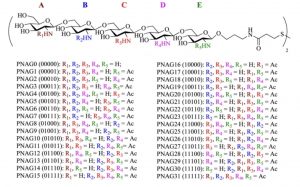The misuse of antibiotics has fuelled the rise of antibiotic-resistant bacteria, posing a global health threat. In a significant breakthrough, researchers have developed a promising vaccine candidate to combat these superbugs.
Bacterial vaccines, alongside antibiotics, represent a vital line of defence against deadly microbes. This new study focuses on creating a carbohydrate-based vaccine for Staphylococcus aureus (staph) and its particularly troublesome cousin, MRSA (methicillin-resistant Staphylococcus aureus). Both staph and MRSA are prevalent causes of bacterial infections.
To develop a vaccine, scientists identify an “antigen,” a molecule recognized as foreign by the body. This triggers an immune response, leading to the creation of antibodies that fight future infections. Carbohydrates, complex sugar structures, offer unique advantages and challenges as vaccine antigens. They are highly specific to certain bacteria, meaning a vaccine targeting one strain might be ineffective against others, even closely related ones.
The ideal scenario is a vaccine that offers protection against a wide range of bacteria. Researchers focused on polysaccharide poly-β-(1−6)-N-acetylglucosamine (PNAG), a carbohydrate present on the cell wall of staph, numerous other bacteria, and even some fungi. This broad presence makes PNAG a promising candidate for offering protection against a multitude of pathogens (Figure 1).

Figure 1: Structures of the comprehensive library of PNAG pentasaccharides. The five-digit number in the bracket for each compound codes for free amine (0) or N-acetamide (1) at residues ABCDE from the non-reducing end to the reducing end of the pentasaccharide, respectively. The five-digit number was then viewed as a binary number and converted to the decimal system as the compound number. For example, 01010 in binary number is equivalent to 10 in the decimal system. Thus, the PNAG pentasaccharide bearing N-acetylation at units B and D only is named as PNAG10.
The specific arrangement of their sugar components significantly impacts their properties as potential vaccine antigens. A slight change in this arrangement can dramatically alter the molecule’s effectiveness. The research team created a library of 32 different PNAG structures, all made from five sugar units (pentasaccharides) but with varying decorations of amines and acetyl groups.
Carbohydrates alone often struggle to induce a strong immune response. To address this, researchers attached the PNAG antigens to a groundbreaking vaccine delivery platform based on a virus (bacteriophage) called Qbeta (written as Qβ). This modified Qbeta (mQβ) is designed to efficiently deliver antigens for carbohydrate-based vaccines. mQβ plays a crucial role in stimulating a robust immune response.
This innovative delivery platform holds promise beyond bacterial infections. It has potential applications in developing vaccines for cancer and even opioid addiction. This breakthrough technology earned the research team well-deserved recognition, highlighting its significance in the fight against various health challenges.
This new research offers a glimmer of hope in the battle against antibiotic-resistant bacteria. The development of this promising vaccine candidate paves the way for further advancements in this crucial area of public health.
Journal article: A comprehensive synthetic library of poly-N-acetyl glucosamines enabled vaccine against lethal challenges of Staphylococcus aureus, Nature Communications.
Summary by Stefan Botha










